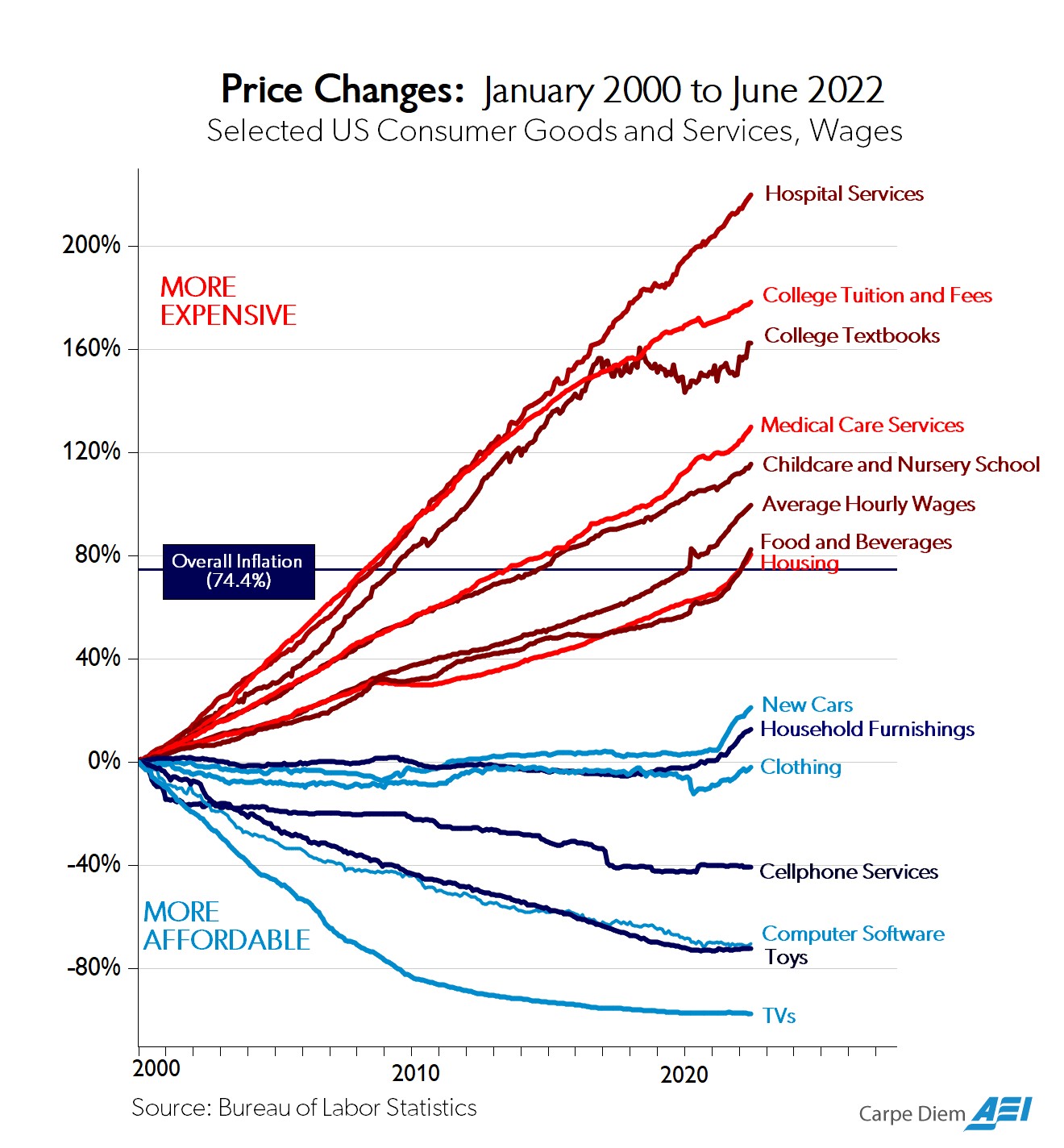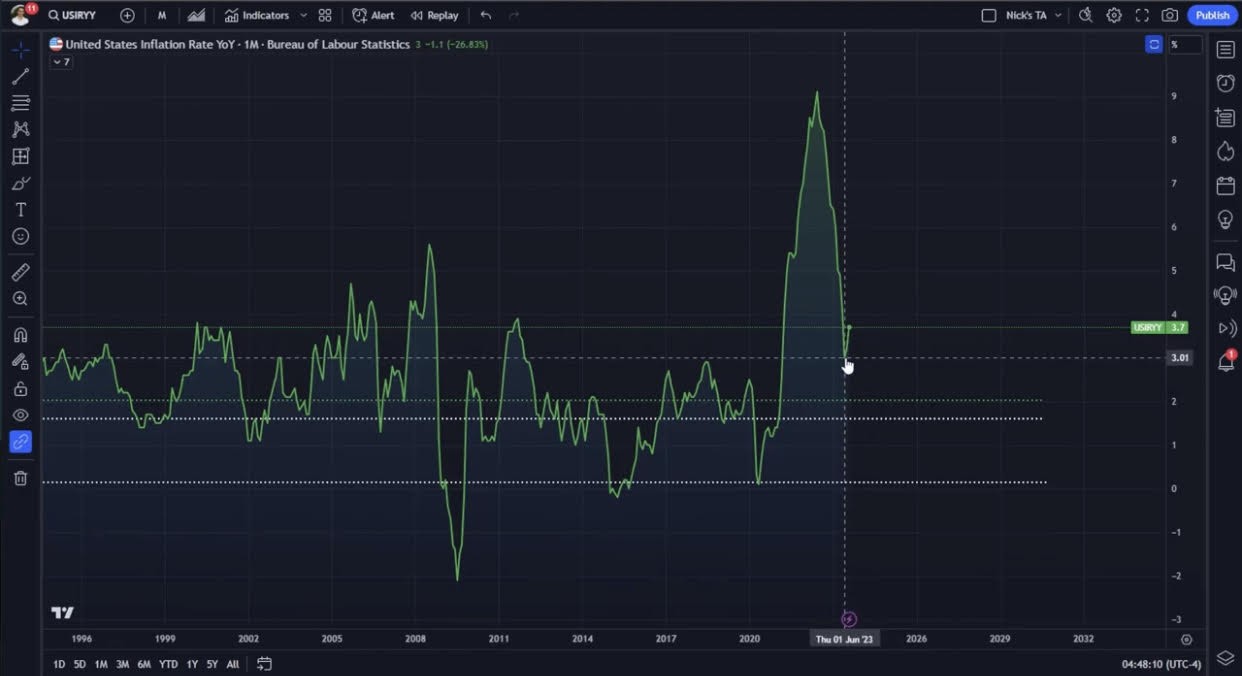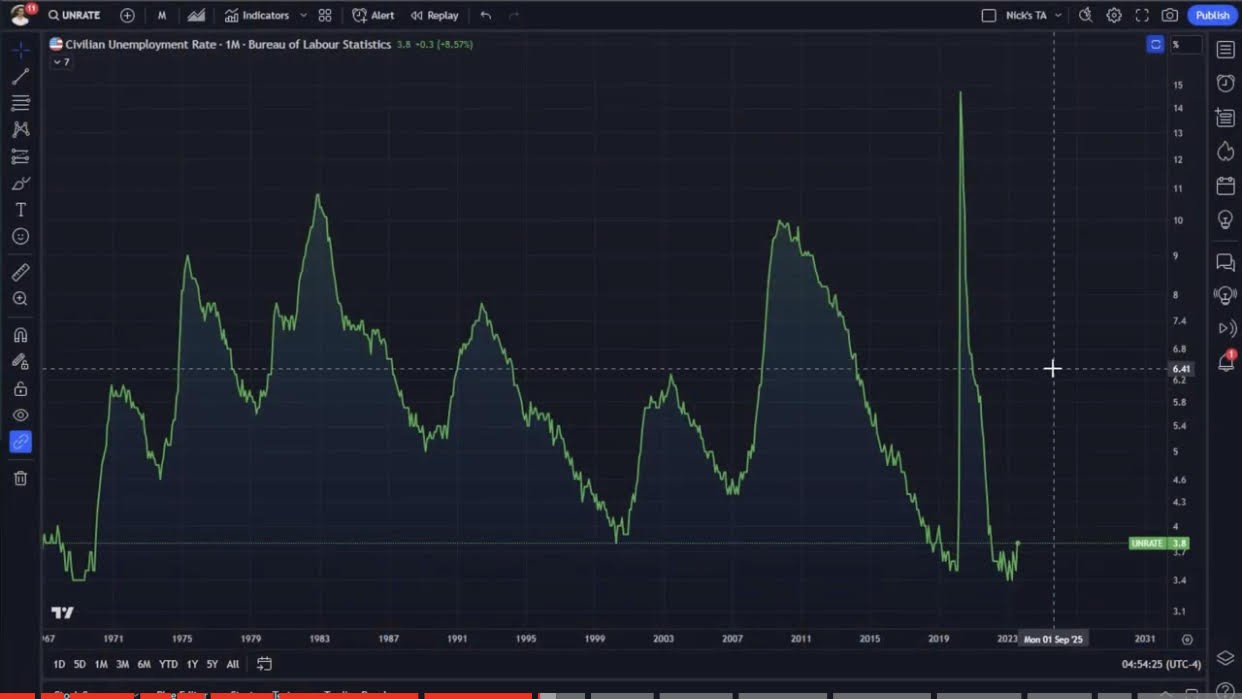by Dr. Chris Kacher
Markets
A potential government shutdown dampened the positive sentiment from Friday's PCE report where core PCE came in at 0.1% vs. est 0.2%. The PCE report slightly reduced the odds of another rate hike based on CME FedWatch. Long bond yields are soaring which makes bonds more attractive that risk-on assets such as stocks and cryptocurrencies.
Lack of liquidity, bond yields, and a strong dollar remain bearish for stocks and crypto. Weakening bullish arguments are that AI is just taking a break before moving higher because their profit margins continue to increase or that nothing goes down in a straight line so expect bonds to bounce from oversold conditions in the near future which could push stocks higher. But such a bounce is likely to be another dead cat bounce which would set up new shorting opportunities. While technologies that grow at an exponential pace are the variable that lends fuel to the "this time is different" argument, such technologies suffer steep corrections when the macro picture remains bearish.
The Fed is going to 1) keep rates at elevated levels for a longer than expected period of time, 2) hike rates, or 3) lower rates. 1) and 2) are bearish for the markets. 3) is even more bearish for the markets since markets have a historical tendency to undergo steep corrections over the ensuing months during such times.
Regulatory capture causes inflation
A deeper discussion on inflation is in order. Regulatory capture benefits the few at the cost of the many thus anti-consumer and a big reason inflation is so high. When it occurs, a small group receives benefits at the expense of the larger population. To change the way things are done in a specific industry, you would have to call your representative, switch your vote, protest in Washington, and organize a lobbying group that will show up year after year with millions of dollars in campaign donations so that it never happens again. Only those with deep pockets win.
Cases in point:
= Germany gave the green light to 96 different companies to make quick COVID tests, but in the US, only three companies received FDA approval. In Germany, these tests cost less than $1, but in the US, they are $12 each. Interestingly, the person at the FDA who approves these tests, Timothy Stenzel, used to work for two of the three companies that were approved.
=Companies dealing with cryptocurrency face certain challenges due to regulations influenced by the financial sector. This is evident in the efforts of Elizabeth Warren's group opposing cryptocurrency.
= Companies trying to create safer nuclear energy face obstacles from rules influenced by oil and gas companies, as well as the environmental groups they support. The decision to use riskier energy sources over nuclear has led to a whopping 59 million more deaths in the last 30 years. Although this should be shocking, people aren't as moved as they are by the images from far less deadly events like the Chernobyl or Fukushima nuclear disasters because they claimed far fewer lives.
= It's distressing that so many people in the US take their own lives due to depression each year. We've known for decades that psychedelics in combination with talk therapy can help treat depression, yet these substances remain classified as top-tier illegal drugs.
=More expensive COVID tests mean three companies benefit at the expense of hundreds of millions of people paying more.It should be a crime to sit on technology without releasing it for too long out of some misguided precautionary principle. But counterfactuals are hard to comprehend. They dont stir emotions. In consequence, MSM doesn't report on all of the people who wouldn’t have died if we used more nuclear instead of coal, all the people who would still be alive if research into psychedelics had continued, or how cheap healthcare and education could be if those industries weren’t captured.
This chart comparing the prices of goods in heavily-regulated versus less-regulated industries shows why inflation is so high.

Government over-regulation often stems from subsidies and rules that hamper the emergence of new competitors, resulting in increasing prices. Services like health care, education, and housing stay pricey compared to goods because they’re not opened up for trade. Governments could allow these services to be tradeable, but they often don’t under the guise of protecting consumers, jobs, and suppliers. Unfortunately, this approach usually leads to excessive inflation in these industries and no real protection. As an example, traditional universities, which represent large monetary interests, have resisted online competition. Startups, like Udacity, could not get the same recognition because they didn’t get government subsidies.
All this shows that there is often a lack of deep understanding of situations. When politicians fail to see how everything interconnects, they end up passing laws that are not economically sound, which leads to higher inflation that costs everyone. This lack of understanding has been evident in issues like global warming, COVID, drugs, sex, terrorism, and money laundering. These complex topics often become tools for the mainstream media, stirring up emotions and leading to the enactment of laws that are reactive, rather than economically sound. So this explains why soaring inflation on a global level is not just due to central bank money printing.
The Fed's current target of a 2% inflation rate is still a long ways off unless the economy goes into recession. One of the Fed members said he thinks we hit 2% in 2025. This is nicely illustrated by the long term chart of the inflation rate. Only the financial collapse of 2008 and Covid's 2020 brought down the rate of inflation in a hurry. The Fed then printed records levels of money in the form of QE which sent the rate of inflation soaring. Since early 2022 when the Fed started to hike rates, inflation has quickly dropped. In consequence of hiking rates faster than at any other time in history, we had the largest number of significant bank failures in history.
Should unemployment start to quickly rise as history has shown it tends to do before recessions, the stock market is likely to fall. Unemployment is already starting to tick higher from the lows of 3.4% to 3.8% where it currently sits. This could be the start of a sharp rise if history is any guide. Today's jobs report came in at 3.8% vs. est 3.7% and a surprisingly high payrolls number of 336K, a 6-sigma beat, which have sent bond yields and the dollar soaring.

Watch for dead cat bounces such as the one in mid-September that brought good profits in the stocks named in our Short Sale Set-Ups reports. As always, we will advise members on the best short sale set-ups as they emerge.
